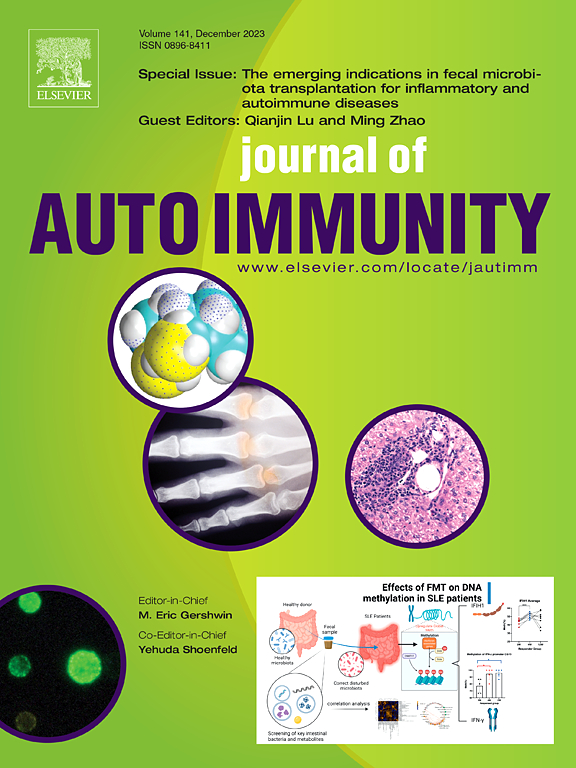自身免疫性疾病的靶向蛋白降解:从机制到治疗突破
IF 7
1区 医学
Q1 IMMUNOLOGY
引用次数: 0
摘要
自身免疫性疾病由于与自身抗原异常免疫反应相关的高风险和广谱免疫抑制剂的局限性而构成重大挑战。目前的治疗方法主要依赖于免疫抑制药物,但其非特异性和副作用促使研究人员探索新的靶点和推进精准医学。靶向蛋白降解(TPD)技术的最新进展,包括PROTAC、MGD和LYTAC,通过精确消除致病蛋白提供了治疗潜力。通过利用细胞降解机制,如泛素-蛋白酶体和内溶酶体系统来克服不可药物的靶标,这些TPD技术为精确免疫调节提供了有前途的治疗策略。临床前研究表明,protac介导的IRAK4降解可减少炎症细胞因子。RIPK2降解物有望成为治疗炎性疾病的新途径。而BTK降解物L18I在阻断自身抗体方面优于抑制剂。还有一些挑战需要克服,比如递送障碍、脱靶效应和有限的E3连接酶多样性。人工智能驱动设计和模块化平台等新兴解决方案可能会提高特异性和有效性。本文综述了TPD技术的潜在机制、治疗突破和转化障碍,并探讨了如何整合人工智能来优化技术。通过提供更有针对性和个性化的治疗方法,TPD策略有可能彻底改变自身免疫性疾病的治疗。本文章由计算机程序翻译,如有差异,请以英文原文为准。
Targeted protein degradation in autoimmune diseases: from mechanisms to therapeutic breakthroughs
Autoimmune diseases pose significant challenges due to the high risks associated with abnormal immune responses to self-antigens and the limitations of broad-spectrum immunosuppressants. Current therapeutic approaches primarily rely on immunosuppressive drugs, yet their non-specificity and side effects urge researchers to explore novel targets and the advancement of precision medicine. Recent advances in targeted protein degradation (TPD) technologies, including PROTAC, MGD and LYTAC, offer therapeutic potential by precisely eliminating pathogenic proteins. By leveraging cellular degradation machinery such as ubiquitin-proteasome an endolysosomal systems to overcome the undruggable targets, these TPD technologies offer promising therapeutic strategies for precise immune regulation. Preclinical studies demonstrate PROTAC-mediated degradation of IRAK4 reduce inflammatory cytokines. RIPK2 degraders are expected to become a new approach for treating inflammatory diseases. While BTK degraders L18I surpass inhibitors in blocking autoantibodies. There are still challenges to overcome, such as delivery barriers, off-target effects and limited E3 ligase diversity. Emerging solutions such as AI-driven design and modular platforms may improve the specificity and efficacy. This review summarizes the underlying mechanisms, therapeutic breakthroughs, and translational hurdles of TPD technologies, and explores how integrating AI can optimize the technologies. TPD strategies have the potential to revolutionize the treatment of autoimmune diseases by providing more targeted and personalized therapies.
求助全文
通过发布文献求助,成功后即可免费获取论文全文。
去求助
来源期刊

Journal of autoimmunity
医学-免疫学
CiteScore
27.90
自引率
1.60%
发文量
117
审稿时长
17 days
期刊介绍:
The Journal of Autoimmunity serves as the primary publication for research on various facets of autoimmunity. These include topics such as the mechanism of self-recognition, regulation of autoimmune responses, experimental autoimmune diseases, diagnostic tests for autoantibodies, as well as the epidemiology, pathophysiology, and treatment of autoimmune diseases. While the journal covers a wide range of subjects, it emphasizes papers exploring the genetic, molecular biology, and cellular aspects of the field.
The Journal of Translational Autoimmunity, on the other hand, is a subsidiary journal of the Journal of Autoimmunity. It focuses specifically on translating scientific discoveries in autoimmunity into clinical applications and practical solutions. By highlighting research that bridges the gap between basic science and clinical practice, the Journal of Translational Autoimmunity aims to advance the understanding and treatment of autoimmune diseases.
 求助内容:
求助内容: 应助结果提醒方式:
应助结果提醒方式:


